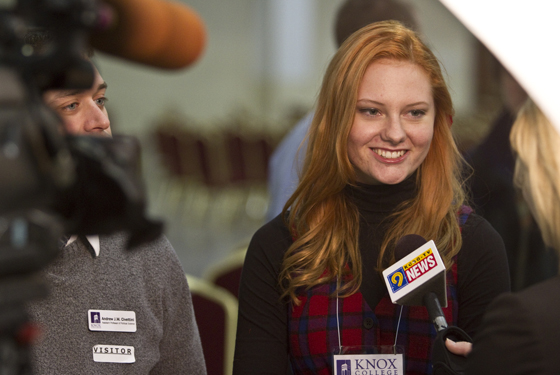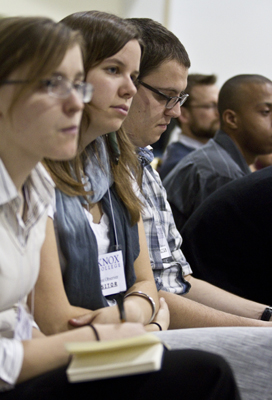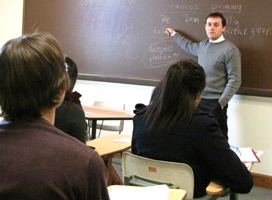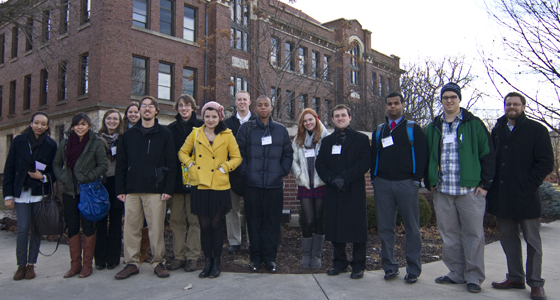

Venture Boldly

Adriana Colindres
Features Editor
2 East South Street
Galesburg, IL 61401

 A group of Knox College students and faculty members found themselves in the thick of the national political scene when they attended the Iowa Republican caucuses on January 3.
A group of Knox College students and faculty members found themselves in the thick of the national political scene when they attended the Iowa Republican caucuses on January 3.
They traveled to Coralville, Iowa, as part of a political science course, Voting and Elections, and observed the first step in the process of choosing the 2012 Republican presidential nominee. The course focuses primarily on two questions: How do people decide whether to vote? How do they decide for whom to vote?
"Part of the point of the trip was to get students to see something that I would teach them about ‘in action,'" said Andrew Civettini, an assistant professor of political science at Knox. "It inevitably lets them have a better grasp of it."
The students agreed. (Above: Andrew Civettini and Delaney Gould of Knox College are interviewed by a Cedar Rapids, Iowa, television station on caucus night. Photo by John Williams '12.)
"This was a unique experience that perhaps most of would never have been able to see," said Jesse Mitchell, a Knox College sophomore from St. Louis, Missouri.
The Knox group -- 13 students and two faculty members -- observed as supporters of Rick Perry, Michele Bachmann, Rick Santorum, Mitt Romney, and Ron Paul took turns speaking, trying to coax more votes for their favored candidates.
 "There's a chance for persuasion at the last minute," Civettini had told his students before they left for Iowa.
"There's a chance for persuasion at the last minute," Civettini had told his students before they left for Iowa.
After the speeches, caucus participants voted by secret ballot. Later, Knox students watched as the participants discussed potential Republican Party platform issues, such as the state party's stance on same-sex marriage and the Social Security program.
"I had always imagined what the caucuses must be like since they get so much media coverage, but I think having the first-person experience gave me a lot of clarity about the process," said junior Gretta Reed, an environmental studies major from Ridgefield, Connecticut.
"I could feel the energy in the room and see how seriously Iowans take the responsibility of having the first caucuses in the nation," she added. "It was cool to see how the caucus was so social and became a community event."
Other students also were impressed with Iowa caucus participants' dedication to the political process.
"It's inspiring to see people wanting to be there and be involved," said Delaney Gould, a sophomore from Tucson, Arizona, who is majoring in political science.
"Here, you go beyond just voting. You can become active in politics right then and there," added senior John Williams, a political science major from Hartland, Wisconsin. "You, yourself, can submit an item for the party platform. Seeing a caucus first-hand opened my eyes to how it works and how it's remarkably different from the other processes."
"You can read descriptions of the caucus as much as you want, but it's different to be there and feel the excitement," added Anna Novikova, a junior from Palatine, Illinois, who is majoring in political science.
An official at the event introduced the Knox group to caucus-goers. Many of them later asked some of the students whether they thought the proceedings were "mind-numbingly boring," Mitchell said.
"Our answer was universally, ‘Not at all,'" he said. "Being able to observe this process will help to make what we learn in class more real and meaningful." (Above left: Knox students observe the caucuses. Photo by John Williams '12. Above right: Civettini and students in the classroom. Below: Knox students and faculty just before they leave for the Iowa caucuses. Photo by John Williams '12.)

Published on January 06, 2012